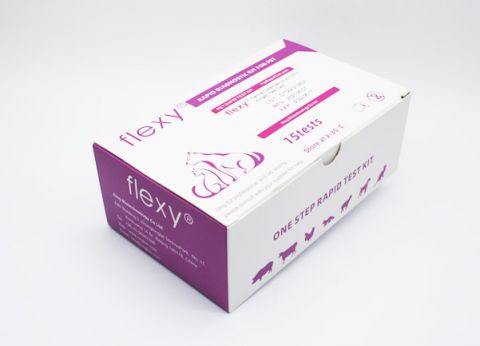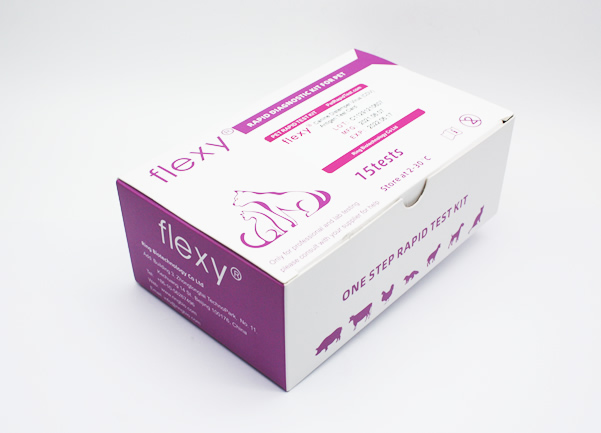
Mycoplasma felis Real-time PCR, M. felis RT-PCR Test Kit is a real-time fluorescence PCR test to detect Mycoplasma felis in cats. Sensitivity & Specificity 100%, GMP certified.
Basic information
Mycoplasmas are widely distributed in nature. Various species of these small prokaryotic organisms cause economically important infections in domestic animals (like mammals and birds), and infect also reptiles, as well as man.
As a normal inhabitant of the respiratory mucosae, M. felis is transmitted directly from the infected cat to the in-contact one by aerosol. Indirect transmission is not important, because mycoplasmas are not able to survive for a long time outside the host
Key facts of the Mycoplasma felis Real-time PCR Test Kit
- Ready to use kits for the vet clinic
- No extraction required
- Result in 30min.
Mycoplasma felis Real-time PCR Test Kit Components
| Item # | Item | Qty |
|---|---|---|
| 1 | PCR reaction solution | 120ul |
| 2 | Negative Control | 50ul |
| 3 | Positive Control | 50ul |
| 4 | Exogenous Gene Control | 50ul |
| 5 | Sample buffer | 1ml |
| 6 | Enzyme mix | 10ul |
| 7 | Kit user manual | 1set |
More about Mycoplasma felis
Mycoplasma felis is frequently isolated from cats showing signs of respiratory or ocular infection however its role as a pathogen is still undefined. Some evidence suggests that M. felis may be a pathogen in ocular infections however evidence for pathogenic involvement of respiratory isolates is far less definitive.
Symptoms of Mycoplasma Infection in Cats
The symptoms of mycoplasma infection can vary based on several factors. The most common symptom is anemia. Clinical signs can vary depending on the severity of the infection and the immune status of the cat. Symptoms are considerably more severe in animals who have immune disorders and weakened immune systems. The location of the infection also affects the type of symptoms the cat will have. Infections can be located in the respiratory system, urinary tract, joints, or reproductive system.
Common symptoms include:
- Anemia
- Lethargy
- Lack of appetite
- Weakness
- Fever
- Yellowing of skin (Icterus or Jaundice)
- Pale skin and mucous membranes
- Nasal or ocular (eye) discharge
Symptoms related to the infection location include:
- Sneezing
- Trouble breathing
- Coughing
- Pneumonia
- Joint inflammation
- Difficulty moving
- Urinary tract infection
- Abscesses
- Reproductive problems (including miscarriage and poor fetal development)
Causes of Mycoplasma Infection in Cats
Mycoplasma infection is caused by exposure to the bacteria. This can occur in almost any setting, as this type of bacteria is very common. It can spread easily between animals, making it common in shelters and kennels as well as multi-pet homes. The infection is not limited to cats and can be caught from or given to other companion animals. Humans are also at risk of infection. Immunodeficiency and conditions that weaken or suppress the immune system increase the risk of contracting the disease.
Diagnosis of Mycoplasma Infection in Cats
A veterinarian can diagnose Mycoplasma infection using various medical testing procedures to visually confirm the organisms in blood, urine, or other fluids. Before proceeding to this step, a physical examination and medical history of the cat are required. Be prepared to discuss the symptoms and timeframes associated with your pet’s illness. If clinical signs point to a bacterial infection, your veterinarian will collect fluids for testing purposes. The fluid collected will depend on the type and location of the symptoms your cat is exhibiting. For example, urinalysis or urine testing are effective in situations where the animal is experience related symptoms. Joint fluid, mucus, and blood samples can also be analyzed. Dye staining has been shown to be an effective method for locating the bacteria that cause the infection in cats.
Treatment of Mycoplasma Infection in Cats
No single treatment or protocol is considered consistently effective in treating Mycoplasma infection. Treatments will vary depending on the severity of symptoms and the location of the infection within the body. Antibiotics are the most common form of treatment, but the type of antimicrobial the bacteria is susceptible to is not the same in all cases. To completely overcome the disease, treatments may continue for an extended period of time. Although treatment plans may differ, most cats will not require hospitalization unless their symptoms are very severe or in animals with poor immune function. Recommended treatments may include:
Antibiotics:
Most cats will require a minimum seven to ten-day course of antibiotics to treat the primary infection. Because Mycoplasma infections can be hard to eradicate, more than one course of antibiotics may be necessary for a full recovery.
Analgesics:
If pain, inflammation, or fever is severe, this category of painkiller may be prescribed. Be sure to carefully follow your veterinarian’s instructions if you will be dosing your pet with painkillers at home. Too much of this type of medication can be very dangerous to your cat.
Extended reading
- Wag Labs, Mycoplasma Infection in Cats
- McLellan, Heather (2017) A phenotypic and genotypic investigation of Mycoplasma felis. MSc(R) thesis




